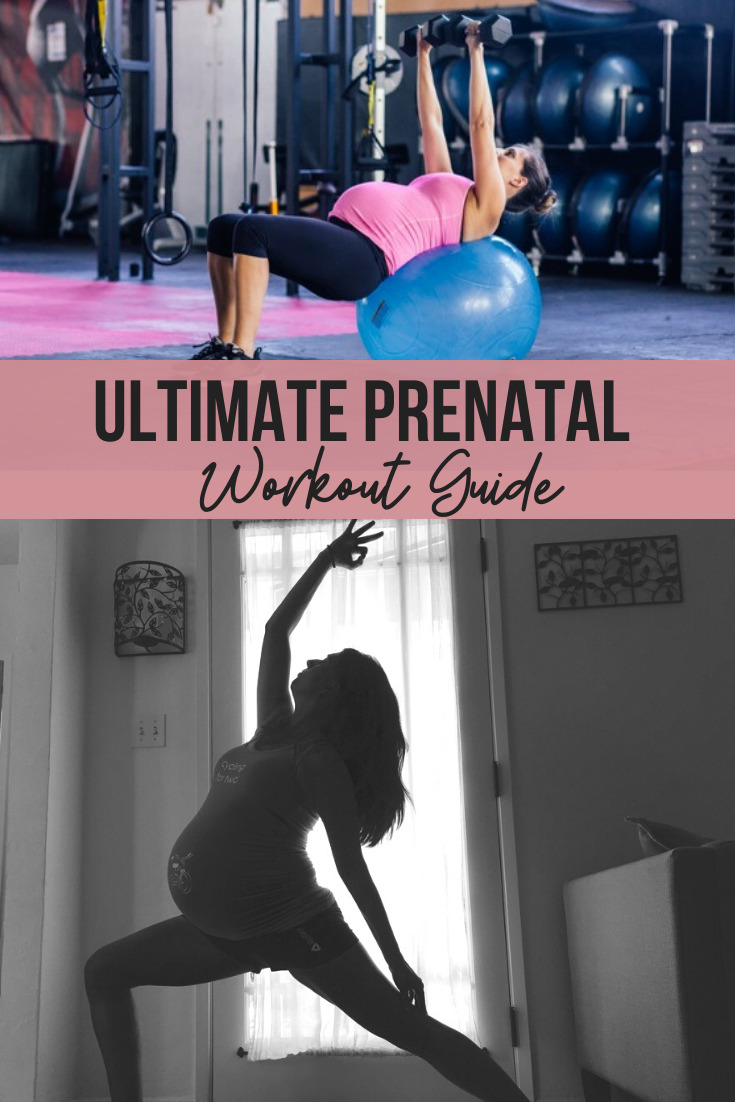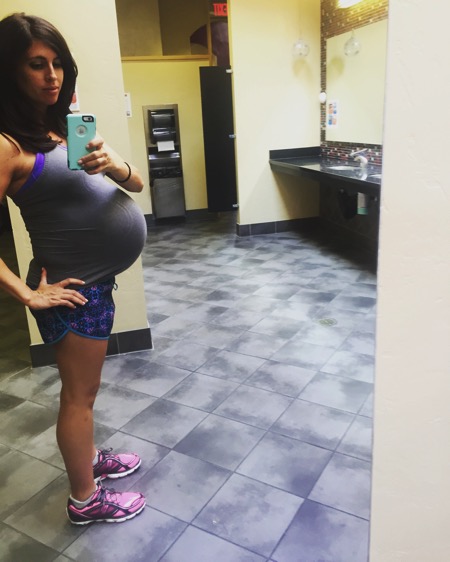
[ad_1]
It’s important to maintain an active lifestyle while pregnant. Here is my ultimate guide for prenatal workouts, so you can exercise in the safest and smartest way possible. As always, check with your doctor before making fitness changes or beginning a new routine, especially while you’re pregnant.
Benefits of Prenatal Workouts
I think we can all agree that movement is a GOOD thing, and is extremely beneficial for pregnant mamas and their growing babies.
Here are a couple of reasons why it’s smart to maintain movement habits during pregnancy:
- Mood, energy level, and endorphins. It’s a mood and confidence boost when you feel like so many things are out of control
- Maintaining muscle mass and strength, which will help your body support itself as it continues to grow and shift center of gravity. Many traditional strength exercises are beneficial for labor, as well as the postpartum recovery period.
- Strengthens your heart
- Can help you to have a healthy pregnancy and potentially avoid gestational diabetes. (If this happens, it’s not your fault. I’m a big believer of doing anything we can to stack the odds in our favor, but also understand sometimes things happen because of genetics or bad luck. It’s not always something you *did* or *didn’t do*)
- Can help you get higher quality sleep
- Active mamas can help provide lasting benefits for their babies
How Pregnancy Will Affect Your Workouts
As always, check with a doctor before making any changes to your fitness routine, especially if you’re pregnant. A good rule of thumb is to focus on MAINTAINING, not ADDING. Now isn’t the time to start anything new or extreme, but focus on maintaining an active lifestyle that you enjoy and that makes you feel good. You don’t want your workouts to deplete you, especially during pregnancy.
Generally, sedentary pregnant mamas can begin a walking routine, with their doctor’s approval.
(Pretty much everyone in the gym thought I was going to go into labor on the treadmill. Also, rest in peace to all of the lululemon tanks I totally stretched out.)
Safety Tips for Working Out During Pregnancy
I mentioned that a good goal is to maintain your current routine, but there are a couple of exceptions to this rule:
- If you current do things in your routine that compromise your balance and increase your risk of falling. (Example: figure skating, gymnastics, slackline, rock climbing, yoga inversions)
- If your current routine includes activities or motions that could cause blunt trauma to your belly (ex: boxing).
- Exercises that include holding your breath for a prolonged amount of time or impact oxygen intake (like deep diving).
In these cases, it can be advantageous to take a break from these activities or modify.
How do I know how hard to exercise?
The “heart rate rule” (not getting your heart rate above a certain number) is outdated. Increased blood flow during pregnancy can cause an artificially increased heart rate. Instead, use the talk test. When you’re working out, you should be able to say your full address without huffing and puffing. If you can’t do this, it’s a good clue to scale back.
When are prenatal workouts not safe?
Prenatal workouts aren’t safe when you struggle to talk from exertion, you are pushing yourself outside your normal limits, you are putting yourself in a compromising position (setting yourself up for a fall, trauma, etc), or when you find that your routine is draining you instead of energizing you.
Workout Modifications for the First Trimester
During the first trimester, you may find that morning sickness and nausea get in the way of your normal workout routine. In these cases, try to find ways to get in small bits of movement throughout the day. Some ideas: neighborhood walks, yoga, Pilates, barre, strength training, dance cardio. Since this is the time when the egg is implanting and begins to grow, I typically recommend lower-impact activities.
Workout Modifications for the Second Trimester
In the second trimester, many mamas feel a welcomed energy boost as morning sickness (hopefully!!) dissipates. You will likely feel the strongest and most energized during this trimester, so it’s important to avoid pushing yourself too hard, even if you feel good. Use the talk test and received exertion – on a scale of 1-10 (10 is sprinting your heart out; 1 is taking a nap), try to keep it in the 5-8 range.
ACOG recommends skipping exercises on your back after the first trimester. The supine position can cause compression on the inferior vena cava, which is a large vein that carries deoxygenated blood from the lower and middle body to the right atrium of the heart. If you’re on your back, the pressure of the baby can compress this vein and reduce oxygen to the fetus. You may start to feel this, and feel uncomfortable, hot, and/or dizzy.
Some women are comfortable performing a short exercise set on their back during pregnancy because it feels completely fine, but to be on the safe side, it’s not recommended. Also, some women experience zero symptoms or feelings when the vein is compressed, so it’s smart to avoid the supine position and also avoid lying on your right side. I wouldn’t risk it, especially because the exercises will always be waiting and it’s such a short amount of time to dedicate yourself to growing a healthy baby. Also, there are ways to safely complete almost ALL exercises during your pregnancy. It just takes a little modification.
Tips on modifying exercises that are typically on your back are here
I would continue to watch the impact during your second trimester, but if you are a runner and want to go for a run, just make sure you’re in an area with a decreased risk of falling or injury.
Workout Modifications for the Third Trimester
In your third trimester, things start to get a little more uncomfortable, as balance and gravity changes with your growing belly. I like to take things back to low-impact during this trimester and focus on general movement and healthy habits. Some of these exercises that are easily modified for impact and to avoid exercising on your back are: walking, prenatal yoga, barre, dance cardio, swimming, hiking, strength training.
Mama friends: what exercises felt the best to you during pregnancy? Are these any modifications or things you loved in your routine?
You may also enjoy:
[ad_2]
Source link









